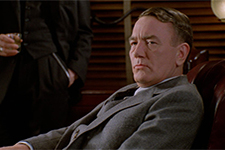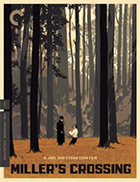Miller's Crossing
|  With their third film, Miller’s Crossing, Joel and Ethan Coen firmly established that they were filmmakers who couldn’t be pigeonholed. Following their feature debut, the gritty, Texas-set neo-noir Blood Simple (1984) and the cartoonish-absurdist crime comedy Raising Arizona (1987), they dug deep into the well of gangster lore, delivering a film that looked and felt nothing like their previous efforts, yet clearly derived from the same artistic intelligence. Simultaneously a deconstruction of the genre and a celebration of all it stands for, Miller’s Crossing is, like so many of the Coens’ best films, an enigma, a fleeting and gripping experience that offers itself up and pulls away from us at the same time, much like the film’s title image of a gangster’s fedora on a leaf-strewn forest floor, blowing away in the wind. Set in an unnamed city in 1929, Miller’s Crossing follows a complex plot involving the conflict between Leo (Albert Finney), the town’s boss, and Johnny Caspar (Jon Polito), a hot-headed rising fixer who is incensed that a bookie named Bernie Bernbaum (John Turturro) has been double-crossing him. Caspar wants to rub Bernie out, but Leo chooses to protect him, less because Bernie pays protection money and more because he is the brother of Verna (Marcia Gay Harden), the younger dame with whom Leo is smitten (despite his tough exterior, Leo is a romantic at heart, which turns out to be his weakness). Leo relies on his advisor, Tom Reagan (Gabriel Byrne), for advice and friendship (“You know I don’t like to think,” Leo tells him at one point), but unbeknownst to Leo, Tom is carrying on a self-loathing affair with Verna. Tom is also courted by Caspar to give up Bernie, which Tom wants to do because it comports with the ethics of his profession, but is reluctant to do because of Verna. Like many Coen protagonists, Tom is an isolated figure, moving among the film’s different, conflicting arenas, his allegiances, his thoughts, and his motives consistently enigmatic. Byrne plays Tom like a man standing outside his own skin, often disgusted by what he sees, but unable to do anything other than continue to play the game, part of which involves his own bad gambling streak and money owed to an off-screen bookie. Once again shot by Barry Sonnenfeld, who had previously lensed Blood Simple and Raising Arizona and was about to launch his own career as a director, Miller’s Crossing is a gorgeous film of dark shadows and earthen tones, scored to lush, poignant orchestra strains by the Coens’ regular composer Carter Burwell. The burnished interiors of lacquered wood and gleaming leather suggest an enveloping interiority that is only occasionally broken by exterior shots of city streets or alleyways. The ornate production design underscores the Coens’ vision of gangsterism as a closed-off world of conflict and betrayal that carries no real meaning beyond its practitioners’ selfish desires (“What’s in it for you?” is a question asked more than once by multiple characters). Everything is a “play,” whether it be a smart play or a dumb play, and the film is about illusion—as Tom tells Leo, he runs the town only because people think he does, and once they stop thinking it, he will lose power. In other words, true power is simply what others believe you to have, and to maintain it is to maintain the illusion of it. Miller’s Crossing constantly reminds us that we can’t trust anything and nothing and no one is fully knowable; to suggest otherwise is to submit to the illusion, rather than to control it. Among the film’s more memorable sequences is the failed assassination of Leo. Detecting the presence of two Tommy-gun-wielding henchmen before they kick open his bedroom door, Leo calmly puts out his cigar and puts on his bedroom slippers before nimbly sliding under the bed as bullets rain down, capping off one assassin with his pistol and then taking his machine gun and riddling the other with bullets through a window after he slips out and down the roof. The scene is majestically shot and edited, scored to the soaring strains of Frank Patterson’s rendition of “Danny Boy” playing on Leo’s phonograph, which underscores the heightened violence (Leo’s gun never seems to run out of bullets). The scene has added kick because, up until this point, we have only seen Leo sitting in chairs and lounging in bed, and the sudden dexterity with which he moves and evades death and dishes it out with such aplomb is surprising and bracing. The film’s other most memorable scene is quite the opposite of Leo’s baroque brush with death, although it also centers on a failed assassination. In this scene, Tom, now working with Caspar, takes Bernie Bernbaum out into the woods to kill him, an act of violence he is clearly uncomfortable with, even as he puts on a menacing persona while marching Bernie into the woods. The scene has a lacerating emotional vibe, as Bernie, previously so sure and arrogant, is reduced to a blubbering mess, wailing and crying about not wanting to die in the woods like a “dumb animal.” The forest setting is a marked departure from gangster iconography, which is almost always centered in the city, and it gives Tom’s moral struggle and Bernie’s pathetic pleading a quality of tortured humanity that is too often overlooked in the Coens’ films. Even though it was chosen for the prestigious opening night slot of the 1990 New York Film Festival, Miller’s Crossing was met with mixed reviews when it was first released, hampered by both a critical misreading of its ornate, self-conscious style as shallow artifice and the fact that it arrived in the middle of a deluge of gangster films that year, including Martin Scorsese’s GoodFellas, Francis Ford Coppola’s The Godfather Part III, Abel Ferrera’s King of New York, Warren Beatty’s Dick Tracy, and even Andrew Bergman’s The Freshman, where Marlon Brando parodied his iconic Don Corleone persona. It was hard for audiences to recognize what the Coens had wrought, and for too long Miller’s Crossing has been sidelined as a minor or mixed Coen effort, especially since it fell in the shadow of their next film, Barton Fink (1991), which won the Palme d’Or at the Cannes Film Festival (and, ironically, was written during a down period in the writing of Miller’s Crossing when the Coens felt stumped and needed to step away from the script for a while). With three decades of hindsight, it is now clear that Miller’s Crossing, far from a failed experiment in genre revisionism, is a classic in its own right, a film of immense narrative complexity and character depth that still has much to reveal.
Copyright © 2022 James Kendrick Thoughts? E-mail James Kendrick All images copyright © The Criterion Collection | |||||||||||||||||||||||||||||
Overall Rating: 


 (3.5)
(3.5)


